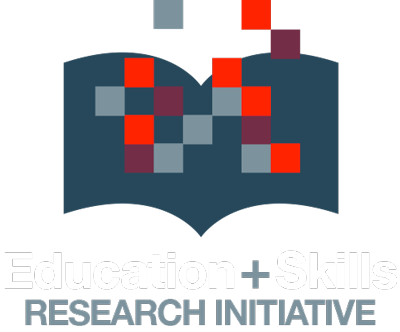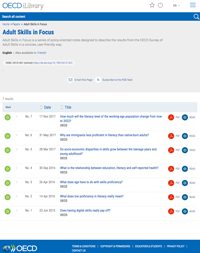

The Research Initiative on Education + Skills accesses, analyzes and mobilizes data relating to the education, skills and labour market outcomes of Canadians to inform policy development. RIES is funded by Employment and Social Development Canada (ESDC) and the Ministry of Training, Colleges and Universities (MTCU). The initiative is led by the Mowat Centre and the Higher Education Quality Council of Ontario (HEQCO).

At its core, RIES seeks to inform policy development by producing research that answers priority policy questions that are identified by the initiative’s Research Advisory Committee composed of leaders in industry, academia, government and the not-for-profit sector. Through a special agreement with Statistics Canada, RIES makes interconnected sets of data that are typically difficult to access and work with, accessible to a network of researchers. These data include:
The RIES is a collaborative initiative that draws on the expertise of several partners. Under the RIES, researchers work with a team of technical analysts to answer a variety of research questions related to education and skills. Specially trained to work with the above data sets, the RIES technical analysts complete the data analysis researchers require to answer their research questions, and researchers prepare policy-relevant research incorporating these findings. Together, the RIES team is creating an accessible, impactful program of research to inform policy development.
Make the data more accessible to policy analysts and researchers both inside and outside of the Mowat Centre and HEQCO.
Use the data to produce a series of studies by both internal and external researchers on key policy issues relating to the education, skills and labour market outcomes of Canadians.
Ensure the findings of the research papers are made accessible to the public policy community in Canada, increasing the long-term impact of this research initiative.




The project is supported through direct funding by Employment and Social Development Canada and the Ontario Ministry of Advanced Education and Skills Development, in addition to contributions from the Mowat Centre and HEQCO. Both the Mowat Centre and HEQCO are funded by the Government of Ontario.
An international programme of assessment of adult skills and competencies initiated by the Organisation for Economic Co-operation and Development (OECD) and administered between 2011 and 2016 in 34 countries. PIAAC assessed the skills and competencies of adults between the ages of 16 and 65 in three domains: literacy, numeracy and problem-solving in a technology-rich environment. It is the first large-scale international assessment of adults to be conducted on computer and to measure individuals’ proficiency in using information and computer technology. In addition to the direct assessment of skills, the PIAAC survey included an extensive background questionnaire that gathered information on respondents’ backgrounds, as well as their use of skills at work and in everyday life. Canada’s sample of PIAAC respondents (25,267) was the largest in the OECD, and included 5,165 respondents in Ontario, as well as oversamples of immigrants, youth, off-reserve Indigenous persons and official language minorities.
A longitudinal survey conducted every two years since 2012 that collects information from 24,000 adult Canadians, including 8,500 PIAAC respondents, about their jobs, education, health and family, and how changes in these areas affect different aspects of their lives. Results from LISA can be linked to the direct measures of skills conducted through PIAAC for those respondents who are included in both surveys. The biennial LISA survey waves include content relating to: education history; employment and income; skills training; personality traits; health, mental health and disability; retirement; assets and debt; and family composition.
Statistics Canada has enhanced the PIAAC and LISA data by linking the surveys to historical tax data from the T1 Family File (T1FF) and from employers’ files (T4), as well as to other administrative data, such as pension and immigration data. This allows the information collected through the surveys and skills assessments to be connected with longitudinal information regarding, among other things, employment status and earnings. The linked tax data covers the period from 1982 to the present.
Taken together, these data sets provide information of an unparalleled depth and breadth relating to the pathways of Canadians into and through the labour market and the factors that determine labour market outcomes, notably factors relating to education, training and skills development.

March 29, 2019
A sizeable gap exists between the PSE completion rate of first-generation students and those whose parents attained a postsecondary credential, despite years of government policies meant to improve access for these and other underrepresented students, finds a new report by HEQCO. Using newly available data, this study finds that policies in Ontario have resulted in overall enrolment growth but have done little to close the postsecondary attainment gap of more than 20 percentage points between first-generation students and their counterparts. However, those who do make it to postsecondary are more likely to complete a program. And once in the labour market, they earn similar incomes and are just as likely to have jobs with pensions, bonuses, managerial status and job permanence. This signals that government resources aimed at supporting first-generation and other underrepresented students would be better spent in the K-12 sector.
MoreDifferences in income between women and men in Canada have been well-profiled. This study contributes to what is known about the relationship between skills and labour market returns by examining how earnings differ among Canadian women and men at different numeracy, literacy and problem-solving skill levels.
In collaboration with:
There is an ongoing debate about whether skills, or the education credentials itself matter more for successful entry into Canada’s labour market. This study seeks to better understand the extent to which skills vs. credentials explain differences in earnings and employment.
In collaboration with:
Most Canadians are employed in standard full-time, permanent roles. However, a growing number hold non-standard positions which can include contract, casual, and/or part-time work. This study examines the relationship between skills and different employment and wage trajectories, quantifying the labour market returns for workers with different skill sets.
In collaboration with:
Building on previous research on immigrants, this study examines the effect of immigration status on employment arrangement (unemployed/ full-time/ part-time), while also considering other factors known to impact labour market outcomes including numeracy and literacy skills, educational attainment level, and demographic factors.
In collaboration with:
Data dictionary,
Without frequency counts
View
Questionnaire with the question flow
View
Data dictionary,
Without frequency counts
View
Study Documentation
View
Questionnaire: International Survey of Adults / Component: Main BQR
View

Adult Skills in Focus is a series of policy-oriented notes designed to describe the results from the OECD Survey of Adult Skills in a concise, user-friendly way.
View
Reports of PIAAC are available here from the Council of Ministers of Education, Canada.
View
